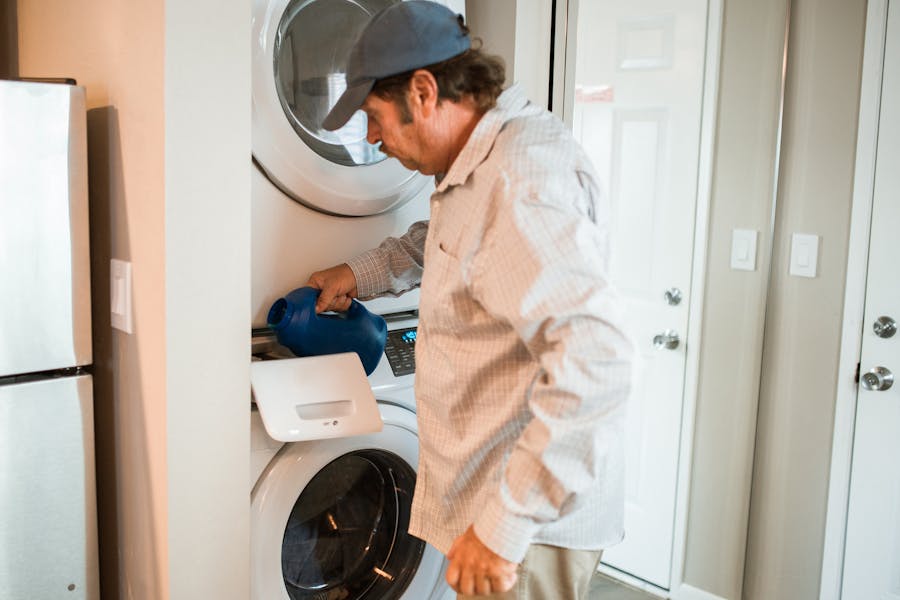As consumers increasingly prioritize sustainability and ethical consumption, the quest for transparency in product sourcing has become paramount. Among the eco-conscious options in the market, Earth Breeze stands out for its commitment to providing eco-friendly laundry detergent. However, with a surge in interest regarding the origins of products, questions have arisen about where Earth Breeze is manufactured. In this article, we delve into the heart of this inquiry to uncover whether Earth Breeze is indeed made in the USA, exploring the implications for consumers and the broader landscape of ethical consumerism.
Is Earth Breeze Made In The USA?
Yes, Earth Breeze laundry detergent is indeed made in the USA. The company prides itself on producing eco-friendly laundry detergent that is manufactured domestically. This commitment to local production aligns with Earth Breeze’s ethos of sustainability and ethical sourcing. By manufacturing in the USA, Earth Breeze supports local economies and ensures greater control over the production process, including quality assurance and adherence to environmental standards. So, if you’re looking for an eco-conscious laundry detergent made in the USA, Earth Breeze is not just a choice; it’s a reliable choice you can confidently make.
Market Reception And Popularity Of The Product
The market reception of Earth Breeze has been overwhelmingly positive, with the product gaining significant popularity among consumers seeking sustainable alternatives for laundry detergent. Since its introduction, Earth Breeze has garnered attention for its innovative approach to eco-friendly cleaning solutions.
Growing Demand for Sustainability: With increasing awareness about environmental issues, there is a growing demand for products that minimize ecological impact. Earth Breeze has capitalized on this trend by offering a detergent that cleans effectively and reduces plastic waste and carbon footprint.
Positive Reviews and Testimonials: Consumer feedback has played a crucial role in driving the popularity of Earth Breeze. Many users have praised its cleaning power, convenience, and eco-friendly packaging. Positive reviews and testimonials shared on various platforms have contributed to its growing reputation as a reliable and effective laundry detergent.
Expansion and Distribution: Earth Breeze’s availability in multiple markets and distribution channels has also contributed to its popularity. The company has strategically expanded its reach, making the product accessible to a broader audience. This expansion has increased sales and enhanced brand visibility and credibility.
Recognition and Awards: Earth Breeze has received recognition and awards for its innovative approach to sustainable cleaning. Accolades from environmental organizations and industry experts have further bolstered its reputation and contributed to its popularity among eco-conscious consumers.
Social Media Influence: The brand’s active presence on social media platforms has helped foster a sense of community among its consumers. Engaging content, including sustainability tips and educational posts, has strengthened the bond between Earth Breeze and its customer base, driving brand loyalty and advocacy.
The Importance Of Product Origin
The importance of product origin cannot be overstated in today’s consumer landscape, where ethical considerations and sustainability have become paramount factors influencing purchasing decisions. Here’s why product origin matters:
Consumers increasingly want to know where their products come from and how they are made. Knowing a product’s origin provides transparency into its production process, helping consumers make informed choices and build trust with brands that prioritize honesty and integrity.
Understanding a product’s origin allows consumers to assess the labor practices involved in its production. Products made in regions with solid labor regulations and fair wages are more likely to align with consumers’ values and support ethical employment practices.
The production location can significantly impact a product’s carbon footprint and environmental sustainability. Products manufactured closer to their point of sale typically have lower transportation emissions, reducing their overall environmental impact. Additionally, products made in regions with stringent environmental regulations may be produced using cleaner manufacturing processes, further minimizing environmental harm.
Choosing products made in one’s own country or region can help support local economies by creating jobs and fostering economic growth. By prioritizing domestically produced goods, consumers can contribute to the prosperity of their communities and reduce reliance on imports.
Certain regions are known for their expertise in particular industries, resulting in products of higher quality and safety standards. Understanding a product’s origin can provide reassurance to consumers about its quality, craftsmanship, and adherence to regulatory standards.
The Company’s Manufacturing Practices And Supply Chain
Understanding a company’s manufacturing practices and supply chain is essential for assessing its environmental impact, social responsibility, and overall sustainability. Here’s why it matters:
Environmental Impact:
Manufacturing can have significant environmental consequences, including resource depletion, pollution, and greenhouse gas emissions. By examining a company’s manufacturing practices, consumers can assess its commitment to sustainability initiatives such as energy efficiency, waste reduction, and use of environmentally friendly materials.
Labor Conditions:
Transparency in the supply chain allows consumers to evaluate the working conditions of factory workers and laborers involved in the production process. Companies prioritizing fair labor practices, safe working conditions, and equitable wages demonstrate a commitment to social responsibility and ethical business practices.
Supply Chain Transparency:
A transparent supply chain enables consumers to trace a product’s journey from raw materials to finished goods, ensuring accountability and ethical sourcing throughout the production process. Companies that provide visibility into their supply chains are committed to transparency, integrity, and accountability.
Ethical Sourcing:
Examining a company’s supply chain can illuminate its sourcing practices and relationships with suppliers. Ethical sourcing involves responsibly sourcing raw materials, avoiding the exploitation of workers or communities, and supporting sustainable agricultural and harvesting practices.
Risk Management:
Understanding the complexities of a company’s supply chain allows for better risk management and mitigation strategies. Companies that diversify their supplier base, monitor supply chain disruptions, and prioritize resilience are better equipped to navigate challenges such as natural disasters, geopolitical instability, and global pandemics.
Impact Of “Made in USA” Label On Consumer Perception And Trust
The “Made in USA” label carries significant weight in consumer perception and trust for several reasons:
- Quality Assurance: Many consumers associate products made in the USA with higher quality and craftsmanship. The label often signifies adherence to rigorous standards of manufacturing excellence, leading consumers to perceive such products as reliable and durable.
- Perceived Ethical Standards: The “Made in USA” label is often associated with ethical labor practices and fair wages. Consumers may view products manufactured domestically as supporting local economies and promoting job creation, aligning with their values of social responsibility and ethical consumption.
- Trustworthiness and Authenticity: The “Made in USA” label can instill a sense of trust and authenticity in consumers. It implies transparency in manufacturing practices, regulatory compliance, and accountability, fostering confidence in the integrity of the product and the company behind it.
- Patriotism and National Identity: For some consumers, buying products made in the USA is a matter of patriotism and national pride. The label symbolizes support for domestic industries, American workers, and the economy, reinforcing a sense of national identity and loyalty.
- Perception of Safety and Compliance: Products manufactured in the USA are often perceived as meeting stringent safety and regulatory standards. Consumers may trust that such products undergo thorough quality control measures and comply with relevant regulations, reducing concerns about product safety and legality.
- Market Differentiation and Competitive Advantage: In an increasingly globalized marketplace, the “Made in USA” label can be a powerful marketing tool for companies seeking to differentiate their products and appeal to consumers’ preferences for domestic goods. It can provide a competitive advantage by leveraging quality, trust, and patriotism perceptions.
Bottom Line
The “Made in USA” label substantially impacts consumer perception and trust. It signifies quality, ethical standards, and authenticity, leading consumers to perceive products bearing this label as reliable, trustworthy, and supportive of local economies. For companies, leveraging the “Made in USA” label effectively can provide a competitive advantage and strengthen brand loyalty. However, businesses need to uphold the values associated with this label, including quality craftsmanship, ethical labor practices, and transparency in manufacturing, to maintain consumer trust and capitalize on its positive associations.











Leave a Reply